by Jeff Lundenberger ~ Posted February 17th, 2017
Or is it “The Oscar goes to…?”
That sounds a little softer – no “loser” implied by the word “winner.” After all, doesn’t the nomination alone make one a winner of sorts? Being chosen as one of the five stellar films or performers or technicians of the previous year is pretty impressive.
But only one person, or group of people, will be called to the stage where they will beam with joy as they receive their gold statue while, briefly, millions of people around the world will witness the disappointed but dignified faces of the four “And the Oscar doesn’t go to’s.” This makes me terribly anxious. Although I’ll often have a favorite I’d like to see win in any given category, my democratic nature urges me to wish everyone could win. Or could they at least turn those cameras away a little faster?
This wasn’t an issue at the 1951 Academy Awards ceremony, ( as they honor achievements for the previous year ) as the ceremony was not yet televised – unless radio listeners of the day could hear the dejected gasps of the 4 non-winners before the outburst of audience applause. I pick the year 1950 because there were 5 actors nominated for 5 fantastic performances in the Best Actress category that year and the winner, Judy Holliday, was undoubtedly worthy of the Oscar. But any award like this is a subjective game and from my perspective, over 60 years later, there are two other actresses who, if I had been a voter at the time, I would have had a hard time choosing between, despite my admiration for the winner’s performance. Was any one of the 5 performances better than any of the others? You say potato, I say potahto, you say tomato, I say tomahto… let’s take a look at the 1950 Best Actress field and see what we can find.
 Judy Holliday won the award for her work in the film “Born Yesterday.” In it, she plays Billie Dawn, the mistress of Harry Brock (Broderick Crawford), a corrupt, boorish, junkyard millionaire who has come to Washington DC in search of political influence, Billie in tow. Oblivious to his own social shortcomings, Brock hires journalist Paul Verrall (William Holden) to soften the edges of former showgirl Dawn.
Judy Holliday won the award for her work in the film “Born Yesterday.” In it, she plays Billie Dawn, the mistress of Harry Brock (Broderick Crawford), a corrupt, boorish, junkyard millionaire who has come to Washington DC in search of political influence, Billie in tow. Oblivious to his own social shortcomings, Brock hires journalist Paul Verrall (William Holden) to soften the edges of former showgirl Dawn.  The two quickly fall in love and Billie is transformed into an intelligent, independent, self-assured young woman. Harry provides the comforts she needs but he’s overbearing and bossy and he belittles her constantly. On the other hand, “I think you look like a lovely girl” is the way Billie is approached by Paul as he supplies her with books and magazines and offers to show her the historical sights of Washington. We quickly see a shift in Billie’s attitude.“I’m stupid and I like it” is her immediate reaction to Paul’s suggestions, but her excitement as she begins to recognize her own potential tells a different story. With his help, Billie blossoms through the remainder of the film, and it is a joy to watch her find the courage to take on Harry at the end, beating him at his own game.
The two quickly fall in love and Billie is transformed into an intelligent, independent, self-assured young woman. Harry provides the comforts she needs but he’s overbearing and bossy and he belittles her constantly. On the other hand, “I think you look like a lovely girl” is the way Billie is approached by Paul as he supplies her with books and magazines and offers to show her the historical sights of Washington. We quickly see a shift in Billie’s attitude.“I’m stupid and I like it” is her immediate reaction to Paul’s suggestions, but her excitement as she begins to recognize her own potential tells a different story. With his help, Billie blossoms through the remainder of the film, and it is a joy to watch her find the courage to take on Harry at the end, beating him at his own game.
 Watching the film it’s impossible to imagine a Judy Holiday that is anything other than Billie Dove. Her Billie puts on airs of sophistication, belied by her squawky, nasal voice, her broad accent and her awkward syntax. Her comic timing and mannerisms are perfect. Watch her shuffle her cards during her gin rummy game with Harry. The scene alone is worth the price of admission. And she is a new character by the end of the film. She’s still a little coarse, but in a more sophisticated and charming way thanks to the self-confidence that that her new self- knowledge has provided. This is Holliday’s first top-billed film role and her portrayal of Billie Dove’s metamorphosis is astonishing.
Watching the film it’s impossible to imagine a Judy Holiday that is anything other than Billie Dove. Her Billie puts on airs of sophistication, belied by her squawky, nasal voice, her broad accent and her awkward syntax. Her comic timing and mannerisms are perfect. Watch her shuffle her cards during her gin rummy game with Harry. The scene alone is worth the price of admission. And she is a new character by the end of the film. She’s still a little coarse, but in a more sophisticated and charming way thanks to the self-confidence that that her new self- knowledge has provided. This is Holliday’s first top-billed film role and her portrayal of Billie Dove’s metamorphosis is astonishing.
* * * * * * * * * *
 Marie Allen, like Billie Dove, experiences a transformation in “Caged,” but this is the story of a fall. Eleanor Parker was in her late 20’s when she played Allen but she’s completely convincing as the 19 year old girl sent to prison as accessory to a robbery in which her husband was killed. An innocent in saddle shoes, she climbs out of the transport van in the prison yard surrounded by other convicts, most of them hardened returnees. Parker gives us a terrified, naive child as she takes a last look out the prison gate at the bright sunshine of freedom, then enters her new, dark hell.
Marie Allen, like Billie Dove, experiences a transformation in “Caged,” but this is the story of a fall. Eleanor Parker was in her late 20’s when she played Allen but she’s completely convincing as the 19 year old girl sent to prison as accessory to a robbery in which her husband was killed. An innocent in saddle shoes, she climbs out of the transport van in the prison yard surrounded by other convicts, most of them hardened returnees. Parker gives us a terrified, naive child as she takes a last look out the prison gate at the bright sunshine of freedom, then enters her new, dark hell.

Pregnant, Marie has a healthy baby in prison. Her mother, however, refuses to care for the child and it is given up for adoption. Hope for an early parole, and the return of her baby, are the only things that sustain Marie. Parker portrays a painful vulnerability at the parole hearing, nervously stroking her hair with panic in her eyes. The denial, from three dour, condescending men, is the first step toward Marie’s final corruption. Her heartbreaking outburst, “I’ll become like them! I’m not like them!” will ultimately be proven untrue.


The point of no return comes when she spends 3 days in solitary, her hair shorn by the abusive, sadistic prison matron. When Marie is released she is a changed person, her face taut and toughened, her walk a swagger as she goes through the prison gates and enters a car with three thugs who will train her in the ways of crime. “She’ll be back.”

 I’m not very familiar with the career of Eleanor Parker but there she is, holding her own with eternally reliable Agnes Moorehead, who plays the sympathetic prison superintendent working to reform conditions at the facility. And Parker is not overwhelmed by Hope Emerson, who received a Best Actress in a Supporting Role nomination for her harrowing portrayal of prison matron Evelyn Harper. These are both the types of performance we expect to be nominated for Oscars.
I’m not very familiar with the career of Eleanor Parker but there she is, holding her own with eternally reliable Agnes Moorehead, who plays the sympathetic prison superintendent working to reform conditions at the facility. And Parker is not overwhelmed by Hope Emerson, who received a Best Actress in a Supporting Role nomination for her harrowing portrayal of prison matron Evelyn Harper. These are both the types of performance we expect to be nominated for Oscars.
* * * * * * * * * *
The other two films that produced Best Actress nominations for 1950 were also dramas. One concerned the vicissitudes of stardom on the Great White Way; the other portrayed a Hollywood as grim and bleak as the prison in “Caged.” The first, that year’s best picture winner “All About Eve,” provided two nominees for Best Actress. The other film, “Sunset Boulevard,” was nominated for Best Picture (as was “Born Yesterday”).
 The title character in “All About Eve” is played by Anne Baxter. Eve is a young actress, come to New York to worship established star Margo Channing, played by Bette Davis, in the role that launched a thousand drag queens. Eve, ingratiates herself into Margo’s glamorous, sophisticated New York universe which is inhabited by a perfect cast that
The title character in “All About Eve” is played by Anne Baxter. Eve is a young actress, come to New York to worship established star Margo Channing, played by Bette Davis, in the role that launched a thousand drag queens. Eve, ingratiates herself into Margo’s glamorous, sophisticated New York universe which is inhabited by a perfect cast that

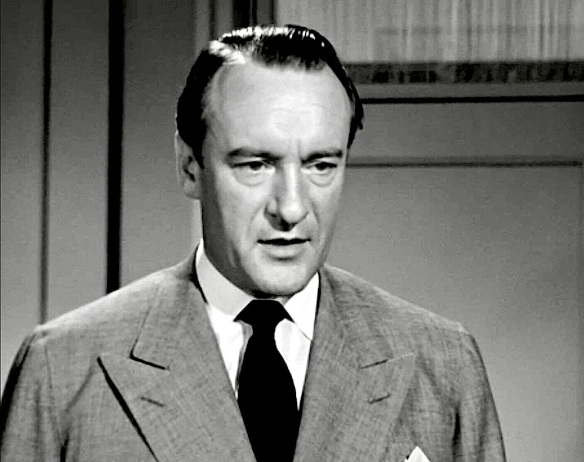
“I am Addison DeWitt. I am nobody’s fool.”

 includes George Sanders, who won an Oscar for Best Actor in a Supporting Role for his turn as diabolical theatre critic Addison DeWitt, Celeste Holm and Thelma Ritter, who were both nominated for Best Actress in a Supporting Role, Gary Merrill, Hugh Marlowe, and a young Marilyn Monroe. But Eve, it turns out, is looking for more than a supporting role. She schemes her way into her own Broadway success – no matter that she tramples all over her new friends to do it.
includes George Sanders, who won an Oscar for Best Actor in a Supporting Role for his turn as diabolical theatre critic Addison DeWitt, Celeste Holm and Thelma Ritter, who were both nominated for Best Actress in a Supporting Role, Gary Merrill, Hugh Marlowe, and a young Marilyn Monroe. But Eve, it turns out, is looking for more than a supporting role. She schemes her way into her own Broadway success – no matter that she tramples all over her new friends to do it.


Baxter is subtle. Her voice is low and breathy and she is all wide-eyed innocence as she shows up, rain-drenched, at Margo’s dressing room door. She doesn’t deviate from this act as she maneuvers her way into Margo’s life, inch by inch, so it’s startling when her claws come out. Watch her turn from obsequious, abandoned friend to blackmailer with a flash in her eye and a sudden, gritty determination when she confronts Holm’s Karen Richards. Alas, she tries her guileless routine on her mentor, DeWitt, but he wrote the rules on that game. She’s no match for the acid-tongued snake charmer, and it is a guilty pleasure watching her finally brought low in her devastating comeuppance.
Karma’s thy name is Phoebe . . .
“I call myself Phoebe.”
Baxter’s performance is not as showy as Parker’s, not as lived-in as Holliday’s, but she excels nonetheless. We are taken in by her lies and posturing right along with the characters in the film. And Eve, too, is transformed, not from bad to good, or dim to bright, but into the uncaring, selfish person she was all along. But for me, convincing as she is, she is overshadowed by the film’s other Best Actress nominee, Bette Davis.
* * * * * * * * * *
Here are the two performances that are, in my eyes, are an amazing cinematic head-to-head draw, Davis as Margo Channing in “All About Eve” and Gloria Swanson as Norma Desmond in “Sunset Boulevard.” Two film legends, the Queen of Warner Brothers and “Queen Kelly” of the silents, playing fictional, show business legends. Both films were comebacks, or “returns,” of sorts for both actors. The quality of Davis’ recent films had had been in decline, while Swanson hadn’t starred in a picture in nearly 10 years. Now both play remarkable, fully realized characters in what might be the best roles of their careers.
Margo Channing moves through life confident of her talent but, having reached a certain age, she’s aware that it may soon be time to assess her career’s future, familiar territory for Davis, as she herself was poised to age into new types of characters.
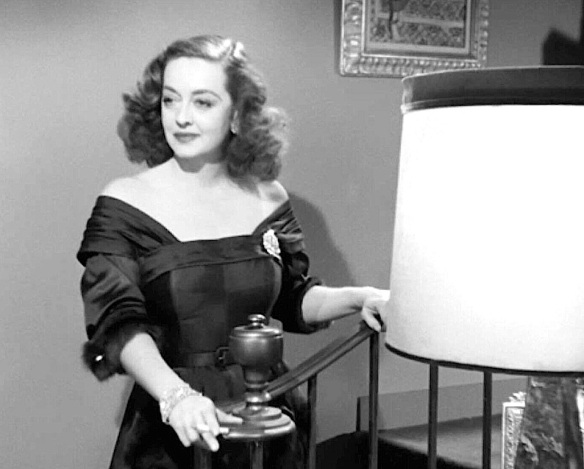
“Fasten your seatbelts. It’s going to be a bumpy night.”
Margo can be caustic but she is not so arch as to not be taken in by the calculating Eve, despite the suspicions of her assistant Birdie (Ritter). And she is insecure enough to be jealous of the non-relationship between Eve and Margo’s director and lover Bill (Merrill).




Lloyd Richards: “I shall never understand the weird process by which a body with a voice suddenly fancies itself as a mind. Just when exactly does an actress decide they’re HER words she’s speaking and HER thoughts she’s expressing?”
Margo Channing: “Usually at the point where she has to rewrite and rethink them, to keep the audience from leaving the theatre!”
She’s tough but vulnerable. Alone with best friend Karen (Holm) Margo lays bare her fears related to love and career in an emotional and touching self-confession. By the end of the film Margo is comfortable with her career and her new place in the theatrical world while Eve has just begun to defend hers.
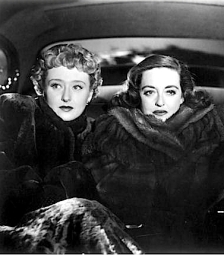
“Funny business, a woman’s career – the things you drop on your way up the ladder so you can move faster. You forget you’ll need them again when you get back to being a woman…”




The familiar Davis diction and exaggerated gestures are there, the biting off of words, the abrupt hand movements and walk. Or do I just think of them as familiar Davis mannerisms because this character overpowers so many of her other characters? No matter. The character Davis has created is so vibrant and realistic it’s as if Davis and Channing are one.
* * * * * * * * * * *
Gloria Swanson and Norma Desmond appear to be one and the same as well, so fearless and dedicated is Swanson’s portrayal. Swanson, too, has unforgettable physical mannerisms, relics from her early days in silent films, and a stilted manner of speech. Desmond is a forgotten silent living in a 


decrepit mansion with a chimpanzee and her ex-husband and ex-director Max von Mayerling, played by Erich von Stroheim, himself a former silent director and star. Into this secluded world falls failed writer Joe Gillis, played by William Holden. Norma no longer has fame but she has money, an asset she uses to lure Joe into staying with her at the house in order to help her write a film she hopes will be her comeback. She also turns Joe into her gigolo.



Holden was nominated for Best Actor for his role, and von Stroheim and Nancy Olsen were both nominated in the supporting role categories. And it’s all held together by the performance of Swanson. Norma Desmond is vain, egocentric, manipulative, and as sure of her place in the world of entertainment as Margo Channing – but Norma no longer has fans, nor the possibility of a career. She’s vicious when crossed but she exhibits something

like humility when she is remembered by cast and crew when visiting a movie soundstage. She shows tenderness and joy with Joe, when he is behaving himself in the manner she expects from him, but she treats Max with a curt disdain that he accepts with a masochistic stoicism. The role could have easily fallen into caricature, but in Swanson’s steady hands Desmond is an honest, ultimately tragic character. Her final scene, Desmond overcome by her delusion, is unforgettable.
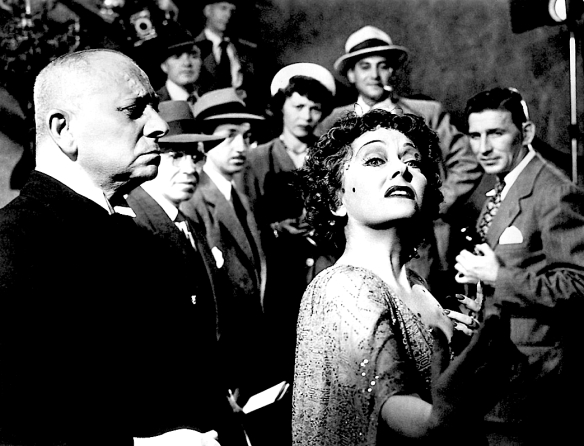
Maybe it’s the quality of the two films that make the performance of Davis and Swanson stand out for me. “Born Yesterday” is a fine film. William Holden’s performance is as good as his performance in “Sunset Boulevard,” and Broderick Crawford bullies his way through the film as if he were Governor of Louisiana. I saw “Caged” for the first time recently and was impressed. It’s a hard-hitting Warner Brothers drama, as dark and nasty as any other film noir of the time.
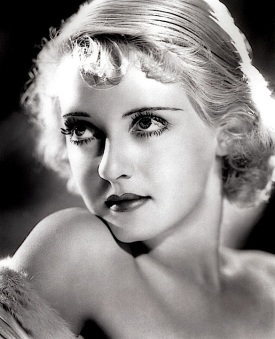

But “All About Eve” and “Sunset Boulevard,” are solid classics, both turning up on more than one Best 100 Films lists. Both I’ll watch faithfully whenever they turn up on TCM. Maybe it’s because of my familiarity with Davis and Swanson. I remember watching both of them on talk shows in the 1970’s. I remember Bette Davis on one, looking rather dowdy but as prickly and self confident as ever. Gloria Swanson was thin, self-consciously elegant, and promoting good nutrition. “Always leave your fruit in a bowl on the counter. Never refrigerate it.” Those are her words of wisdom I remember to this day. I loved them both.
 Maybe it’s just their incredible performances, characterizations of stardom so perfect that they made themselves open to easy parody, fodder for immortal camp. Who doesn’t remember Carol Burnett’s Norma Desmond, or every other female impersonator’s Margo Channing? Who hasn’t repeated, at one time, the immortal lines: “All right Mr. DeMille, I’m ready for my closeup.” “Fasten your seat belts. It’s going to be a bumpy night.”
Maybe it’s just their incredible performances, characterizations of stardom so perfect that they made themselves open to easy parody, fodder for immortal camp. Who doesn’t remember Carol Burnett’s Norma Desmond, or every other female impersonator’s Margo Channing? Who hasn’t repeated, at one time, the immortal lines: “All right Mr. DeMille, I’m ready for my closeup.” “Fasten your seat belts. It’s going to be a bumpy night.”
I’m thrilled that Judy Holiday won the Academy Award for Best Actress of 1950. It’s a great honor for a great performer in a film career that was much too short. But let’s not forget she had some great competition.
CINEMAVEN: Check HERE for this year’s 2016 Academy Award nominees!
[ H O M E ]
________________________________________________________________________















Spot on, Jeff! I am on Team Bette, but like you, have a very difficult time choosing between Davis and Swanson in these roles. Complex, letter-perfect performances in brilliant films….and isn’t it interesting and sad that the roadblocks that aging actresses Davis and Swanson/Margo and Norma experienced still exist today?
LikeLiked by 1 person
So true Susan. Funny, I had just read this story from the Guardian about age and the Oscars when I saw your post. Thanks for reading the piece and I’m glad you enjoyed it!
LikeLiked by 1 person
What a ridiculously talented field! The choices are too tough and I’m glad it’s not on me to decide on just one. Love them all- SUNSET BOULEVARD, ALL ABOUT EVE, CAGED and BORN YESTERDAY are all such iconic classics bursting in talented performances that I can, and do, watch over and over. Great piece, Jeff! Thanks for joining our blogathon. 🙂
LikeLiked by 1 person
Thanks Kellee! It’s always hard for me to pick just one out of five but that year was a killer! And thank YOU for hosting! I know it’s a lot of work. Looking forward to seeing you in April!
LikeLiked by 1 person
Great post, Jeff. Wow, that’s one hell of a field, all are great performances. Three of them are transformations, and the other two are wearing masks.
Judy Holliday is a beautiful woman, who like many beautiful women has learned to get everything she wants from her looks. Had William Holden not come into her life, she might have never changed, but he does and she blossoms into a woman as beautiful in mind and spirit as she is in body.
Eleanor Parker transforms from an innocent girl into a hardened criminal all because she made one mistake, fell in love with an a-hole. The movie is an indictment of our penal systems. Despite the efforts of a well-meaning, but powerless, Agnes Moorehead, she makes the only choice that she can to survive, become every bit as hard and cruel as those around her.
Bette Davis transforms from an actress and a star into a normal woman. Realistically, despite her success, she knows her career is on the decline. Her talent and vanity won’t let her admit it. Eve acts a catalyst to make it all happen all at once. Sure she is bitter and angry, but she comes through it stronger and ultimately happy with her life.
Anne Baxter is wearing a mask. She is not corrupted by stardom. She was corrupt from the start. Thelma Ritter sees the mask immediately, but jaded as she is, she cannot imagine what is underneath. That’s because the mask is so well constructed. It comes off little by little as the film progresses. By the end, the audience like the other characters in the film cannot believe how evil she really is. In the end, Anne Baxter has exactly what she want and deserves. And because she got it through deceit and treachery, you can see her inevitable fall will be infinitely worse than Bette Davis’.
Finally, Gloria Swanson is wearing mask too, but hers is cracked and tattered and barely hanging on her face. She isn’t fooling anyone except herself. Everybody, the audience included, can see that she is crazy. The only thing her mask hides is her fragility. William Holden, because he genuinely cares for her and is a nice guy, tries soften the blow. Instead, she shatters and Holden pays the price.
I’m just glad I didn’t have to vote. They’re all so different. It’s like comparing an apple to an orange to a pizza to a filet mignon to a deep-fried Snickers. How would you choose?
LikeLiked by 1 person
Thanks Chris! I think you wrote a better piece than I did, with fewer words! Apple, orange, pizza, filet mignon, deep-fried Snickers is hilarious! See you soon!
LikeLiked by 1 person